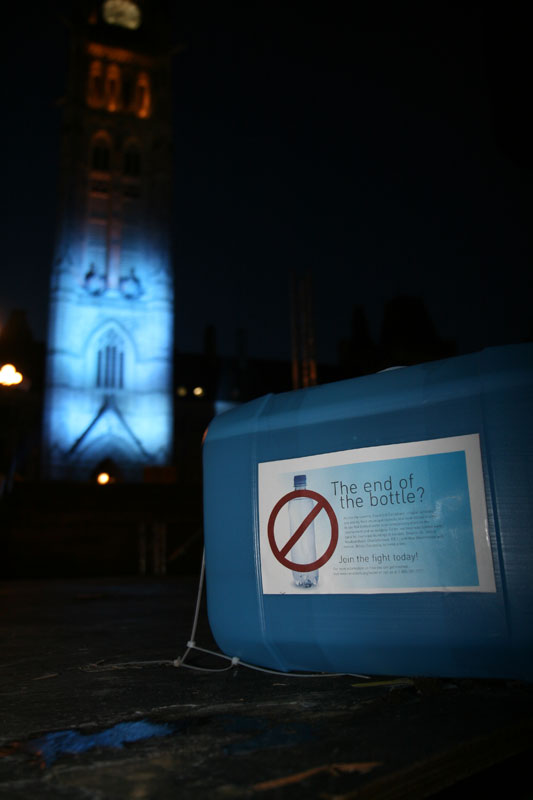A sea change is underway on this World Water Day, 2009. Climate change and commodification are causing increased global water scarcity. And water warriors are quickly becoming the new wave of the 21st century environmental justice movement.
The modern environmental movement arguably got its start with Rachel Carson’s 1962 book, Silent Spring. Carson, a lifelong biologist, wrote the book to raise the alarm about the dire ecological consequences of the pesticide industry: namely a silent spring absent of birdsong. Rachel Carson was a bestselling author with a passion for water when she wrote Silent Spring, with her “sea trilogy” of The Sea Around Us, The Edge of the Sea, and Under the Sea-Wind, already under her belt.
Today, nearly fifty years after Silent Spring, another kind of spring is at risk of going silent. Water, the very substance that enables life to exist, is under serious threat around the world. Carson warned, “In an age when man has forgotten his origins and is blind even to his most essential needs for survival, water along with other resources has become the victim of his indifference.” The accumulated abuse of our freshwater heritage is resulting in a new wave of environmentalism that is sweeping Canada and the world. The global grassroots movement to enshrine water as a human right is making blue the new green.
There are two competing narratives about the earth’s freshwater resources being played out in the 21st century. On one side is a powerful clique of decision-makers, heads of some powerful states, international trade and financial institutions and transnational corporations who do not view water as part of the global Commons or a public trust, but as a commodity, to be bought and sold on the open market.
On the other is a global grassroots movement of local communities, the poor, slum dwellers, women, indigenous peoples, peasants and small farmers working with environmentalists, human rights activists, progressive water managers and experts in both the global North and the global South who see water as a Commons and seek to provide water for all of nature and all humans.
In Canada, there is no national strategy to address urgent water issues and no federal leadership to conserve and protect our water. The Federal Water Policy is nearly 40 years old and badly outdated. As it stands, Canada is one of just a handful of countries to go on record at the United Nations to oppose the right to water. In the past six years member nations of the UN have pushed for recognition of the human right to water three times. On each occasion, Canada has rejected the efforts to have water recognized as a right.
This is the last year of Canada’s membership on the UNHRC (the UN Human Rights Council) and is now seeking a seat on the Security Council. Canada is vying for this seat against Portugal and Germany, countries which already endorse the right to water.
The most recent joint resolution promoted by Germany and Spain aimed to establish a ‘Special Rapporteur’ with the mandate to provide guidance on the right to water and sanitation, identify best practices, investigate country situations and promote the right internationally.
This followed a report by Louise Arbour, the former UN High Commissioner for Human Rights stating that “specific, dedicated and sustained attention to safe drinking water and sanitation is currently lacking at the international level” and recommended that access to safe drinking water and sanitation be recognized as a human right.
The Canadian government was responsible for the position of UN ‘special rapporteur’ on water being downgraded to an ‘independent expert’ serving for only one year instead of the originally proposed three years, and with a much narrower mandate.
Canada also ensured that the independent expert would not have a mandate to visit individual countries, preventing facts-based assessments of the status of the right to water and sanitation around the world.
The reality is the originally proposed resolution would have been at odds with the North American Free Trade Agreement, which defines water as a good and an investment. The real issue is the federal government’s refusal to re-open NAFTA to remove water. They would rather deny Canada and the world the right to water.
The fact that water is not acknowledged as a right has allowed decision-making over water policy to slip away from the UN and governments toward institutions promoting water privatization, which has harmed the environment and cut poor communities off from their water supplies around the world.
Recognizing water as a human right is vital to ensuring that governments address the reality of more than a billion people who are currently without access to clean water. So, the choice is ours as to whether we let our flowing streams become silent springs. The good news is there is a movement rising to reclaim water as a human right. I hope you will join us.
Prime Minister Harper pledged legislation banning bulk water exports in the 2008 throne speech, albeit in very vague language. But it is outrageous that Canada, with all its water privileges would deny the right to water to the poorest people on earth. Unless the Harper government stops blocking UN resolutions on the right to water, it should not be granted the seat it is seeking on the UN Security Council.
What we need now is an international blue covenant to protect water as a human right, and a national water policy in Canada to protect this precious resource from commodification. The choice is clear. Will we let our flowing streams become silent springs or will we recognize water as a human right and protect it accordingly?
Maude Barlow is the national chairperson of the Council of Canadians, author of Blue Covenant: The Global Water Crisis and the Coming Battle for the Right to Water, and senior advisor on water to the President of the UN General Assembly.



